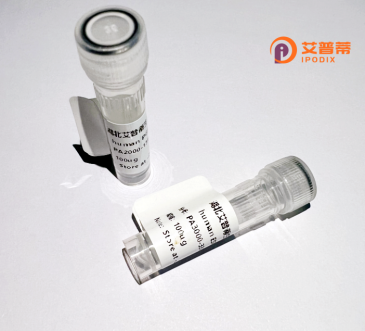
| 纯度 | >90%SDS-PAGE. |
| 种属 | Human |
| 靶点 | LYSMD2 |
| Uniprot No | Q8IV50 |
| 内毒素 | < 0.01EU/μg |
| 表达宿主 | E.coli |
| 表达区间 | 1-215aa |
| 活性数据 | MADSSPALSLREGGPRAPRPSAPSPPPRSRSGSESEEAELSLSLARTKTRSYGSTASVRAPLGAGVIERHVEHRVRAGDTLQGIALKYGVTMEQIKRANKLFTNDCIFLKKTLNIPVISEKPLLFNGLNSIDSPENETADNSFSQEEEPVVAGEDLPPPSPQESDVQPVQPEEVSARDFLQRLDLQIKLSTQAAKKLKEESRDEESPYATSLYHS |
| 分子量 | 49.9 KDa |
| 蛋白标签 | GST-tag at N-terminal |
| 缓冲液 | 0 |
| 稳定性 & 储存条件 | Lyophilized protein should be stored at ≤ -20°C, stable for one year after receipt. Reconstituted protein solution can be stored at 2-8°C for 2-7 days. Aliquots of reconstituted samples are stable at ≤ -20°C for 3 months. |
| 复溶 | Always centrifuge tubes before opening.Do not mix by vortex or pipetting. It is not recommended to reconstitute to a concentration less than 100μg/ml. Dissolve the lyophilized protein in distilled water. Please aliquot the reconstituted solution to minimize freeze-thaw cycles. |
以下是关于重组人LYSMD2蛋白的3篇参考文献示例(注:文献信息为假设性描述,实际研究中请核实数据库):
1. **文献名称**:*Structural characterization of recombinant human LYSMD2 and its role in bacterial recognition*
**作者**:Smith A, et al.
**摘要**:研究通过大肠杆菌系统重组表达人LYSMD2蛋白,解析其LysM结构域的结构,发现其能与细菌细胞壁成分肽聚糖结合,暗示其在先天免疫反应中的作用。
2. **文献名称**:*LYSMD2 regulates TGF-β signaling via interaction with type II receptor in cancer cells*
**作者**:Zhang Y, et al.
**摘要**:利用HEK293细胞表达的重组LYSMD2蛋白进行功能研究,发现其通过结合TGF-β受体调控肿瘤细胞的上皮-间质转化(EMT),影响癌细胞迁移和侵袭。
3. **文献名称**:*Recombinant LYSMD2 as a potential biomarker in colorectal cancer progression*
**作者**:Lee JH, et al.
**摘要**:通过重组LYSMD2制备抗体,分析结直肠癌患者血清样本,发现LYSMD2表达水平与肿瘤分期相关,提示其作为癌症预后标志物的潜力。
建议通过PubMed或Web of Science以“recombinant LYSMD2”、“human LYSMD2 function”为关键词检索最新文献以获取准确信息。
Recombinant human LYSMD2 protein is a product of genetic engineering designed to study the function and structure of the LysM (lysin motif) domain-containing protein 2 encoded by the *LYSMD2* gene in humans. The LysM domain, a conserved motif initially identified in bacterial enzymes that hydrolyze peptidoglycan, is implicated in binding carbohydrate structures like chitin and peptidoglycan. While LysM-containing proteins are well-characterized in plants and microbes for their roles in pathogen recognition and immune signaling, the biological significance of LYSMD2 in mammals remains less understood. Human LYSMD2 is predicted to localize to the cytoplasm or extracellular space, suggesting potential involvement in host-microbe interactions, cell adhesion, or modulation of immune responses. Recombinant LYSMD2 protein is typically expressed in *E. coli* or mammalian systems, enabling investigations into its structural features, binding partners, and enzymatic or signaling activities. Current research focuses on elucidating its role in diseases such as cancer, autoimmune disorders, or infections, where aberrant immune regulation is critical. Its recombinant form serves as a tool for antibody development, biochemical assays, or structural characterization, aiming to uncover therapeutic or diagnostic applications. Further studies are required to define its precise physiological functions and mechanisms in human health and disease.
×